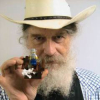Robert T. Bakker

Robert T. Bakker
Robert Thomas Bakkeris an American paleontologist who helped reshape modern theories about dinosaurs, particularly by adding support to the theory that some dinosaurs were endothermic. Along with his mentor John Ostrom, Bakker was responsible for initiating the ongoing "dinosaur renaissance" in paleontological studies, beginning with Bakker's article "Dinosaur Renaissance" in the April 1975 issue of Scientific American. His special field is the ecological context and behavior of dinosaurs...
NationalityAmerican
ProfessionScientist
Date of Birth24 March 1945
CountryUnited States of America
Land bridges were everywhere during the extinction, many species were spreading, and there were many diseases.
Fossils have richer stories to tell - about the lub-dub of dinosaur life - than we have been willing to listen to.
Dinosaurs are the jumper cables to the human mind. Kids can't curb their enthusiasm when they're in a hall of dinosaurs and mammoths and mammoth hunters and trilobites and giant fish that could chomp up a shark. These natural objects in motion and context make kids want to read; you can't stop them from reading and thinking.
I'll bet you a six-pack of Coors that pretty soon, people will be discovering Cretaceous parasites inside Cretaceous bones. The possibility of looking into epidemiology and pathology is pretty cool.
The impact of the magazine was very strong. As I said, it portrayed dinosaurs as part of the geological history, part of the story of life on earth. It struck that paleontology was the career for me.
When looking at the evidence of feeding on large prey, you can see every size tooth from hatchling to adult in one spot. The babies may have been fed in the nest until they were full grown, like in eagles and hawks.
I also discovered the only complete Brontosaurus skull.
The public image of dinosaurs is tainted by extinction. It's hard to accept dinosaurs as a success when they are all dead. But the fact of ultimate extinction should not make us overlook the absolutely unsurpassed role dinosaurs played in the history of life.
In 1941 Richard Owen said that the dinosaurs were almost hot blooded.
Traditional dinosaur theory is full of short circuits. Like the antiquated wiring in an old house, the details sputter and burn out when specific parts are tested.
At Harvard I was in charge of the comparative anatomy labs.
I want to be the Bob DeNiro of the Jurassic.
To me it seems that the warm blooded dinosaurs replaced advanced mammal ancestors that were warm blooded, also.
I want to find a voracious, small-minded predator and name it after the IRS.